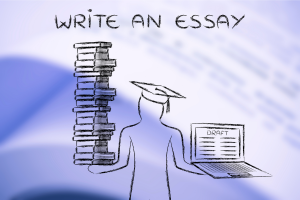Prelaw students begin preparing for law school early. Some as far back as high school and middle school. But most don’t start preparing in earnest until their university days, when their professional future and goals are coming into focus. Like many graduate professional programs, law is extremely competitive, academically rigorous and demands a strong spirit. Undergrads who hope to not only get accepted but succeed in the cutthroat world of legal studies need to steel themselves well ahead of time.
To do so requires a balance of cultivating the right skills, pursuing the best opportunities and—as any law school student will tell you—thorough research.
Develop the “Write” Skills
Being a good lawyer means more than just becoming a brilliant legal mind and rhetorical shark. Those abilities are rooted in specific skillsets law students must develop. Primarily writing and research, but also communication and other soft skills. Critical thinking, analysis, attention to detail and the patience to parse through complex legal documents are all skills that take time and effort to strengthen. Your undergraduate courses will naturally start building on these but make a focused effort to work on the skills you need for law school.
Take courses that require heavy research or long written assignments. Explore research opportunities outside the classroom. Pursue extracurriculars or join clubs that challenge you. For instance, try participating in a debate club or writing contests that puts you in competition with others. Law school will most definitely test your battle skills, too!
Develop the right skills (writing, reading, research, critical thinking, analysis. Take the right courses yes but also pursue the right opportunities, i.e. research, extracurriculars, clubs etc.)
Explore Your Career Paths
There are hundreds of paths within the field of law to choose from, and it is worth thinking about where you want your legal career to take you. Perhaps you already have a destination in mind, or you’re open to exploring the possibilities.
Whether you have a set career goal in mind or not, it’s worth thinking about why you want to pursue law school. Law school personal statements are powerful tools in your application, and the more engaging your story, the better.
If you’re not sure where to start, many universities have prelaw advisors or prelaw organizations that can help you. This is a prime opportunity to start building relationships with your professors or find a prelaw mentor who can write you a recommendation letter for law school. You’ll also gain access to more opportunities where you can get legal experience, such as summer programs, internships or even volunteering experiences. A prelaw advisor can also point you in the direction of on-campus prelaw clubs or upcoming law forums and events that might interest you.
Connect With Your Major
It might surprise you to learn that law schools don’t have strong preferences for any one undergraduate major. In fact, law schools admit students from almost all backgrounds, and there are actually very few designated “prelaw” undergraduate degrees.
Some undergrad majors help prepare you for law school of course, such as economics, political science, business and criminology, but there are plenty of law students who come from mathematics, sciences and humanities backgrounds, too.
The key here is to choose an undergraduate major you can excel in. Law school acceptance rates are hugely competitive, and presenting a high GPA is a must. Law schools want to see that you can handle a rigorous academic courseload, because they won’t take it easy on you. Choosing an undergraduate major that interests you, engages you and challenges you is more likely to mean you are passionate about your learning and earning better grades. This translates better to law school admissions than picking a “law-related” major.
Get to Know the Law
It’s key to research law programs as an undergrad. Not just so you can build a list of schools to apply to, but so you can understand what being a student of the law is like. Law schools encourage potential students to visit and take the campus tour, to connect with current law students and ask questions, and to attend law forums and learn more about the legal profession. All of this research will help solidify for you whether law is the right choice for you, and which programs are your top selections.
Law schools also value applicants who have some experience with the law already. Through internships, job placements or extracurricular activities, you can demonstrate that you have exposure to the profession. Many prelaws find work as paralegals or legal secretaries to gain some experience before applying to law school.
Prepare for the LSAT
If you plan to apply to law school straight after graduating, you should include LSAT prep in your plans. Prelaws often study for and take the LSAT in their final years of undergrad, and the test is not something you can prepare for overnight!
The LSAT, or Law School Admissions Test, is commonly required to attend law school, and is regarded as one of the toughest exams out there. Students can dedicate 4-6 months to LSAT preparation, and this while you need to juggle your studies and keep your grades up. Unless you plan to take a gap year before law school and take the test then, start preparing a solid study plan early.




